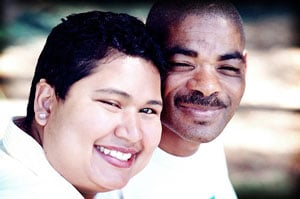Health Disparities Conference Resources Now Online (OHSU UCEDD)
July 28, 2013

|
Dr. Willi Horner-Johnson, a faculty member in the Institute on Development & Disability at Oregon Health & Science University, (OHSU UCEDD) led a multi-institute team in organizing Health Disparities Research at the Intersection of Race, Ethnicity, and Disability: A National Conference. The conference was held April 25-26 in Washington, DC.
The conference was sponsored by the Association of University Centers on Disabilities, the Agency for Healthcare Research and Quality, and the Special Hope Foundation. It brought together researchers and advocates in both the disability field and the racial and ethnic health disparities field. The goal was to focus increased attention on the health and healthcare needs of people with disabilities in underserved racial and ethnic groups. More than 200 researchers, public health professionals, and community advocates attended the conference. Attendees learned about research on health disparities impacting people with disabilities in underserved racial and ethnic groups, and made recommendations for future research.
Dr. Camara Jones, a nationally renowned health disparities researcher, gave a riveting and illuminating keynote address. She used allegories to illustrate the role of institutionalized racism, ableism, and other forms of inequity in establishing and maintaining disparities in health services, the social determinants of health, and social determinants of equity. Another conference highlight was a panel of Asian, African-American, and Latino individuals with various types of disabilities talking about problems they have encountered when attempting to obtain healthcare. Barriers included inadequate insurance coverage, inaccessible facilities, negative attitudes, and refusal of services. That panel was followed by presentations from researchers and advocates summarizing key issues and current data on health and healthcare disparities impacting people with disabilities in underserved racial and ethnic groups. Conference attendees then participated in small group discussion to identify important problems and gaps, and develop recommendations for future research. The recommendations prioritized by the groups included specific research questions, broad areas where more research is needed, and policies and principles for how research should be conducted. The conference closed with a panel of representatives from federal funding agencies reacting to the groups' research priorities, and discussing their thoughts on opportunities for advancing those priorities.
The conference grew out of a research project based at OHSU and directed by Dr. Horner-Johnson. Project Intersect: Addressing Health Disparities at the Intersection of Race, Ethnicity, and Disability was funded by a cooperative agreement between the CDC's National Center on Birth Defects and Developmental Disabilities and AUCD. The project was conducted in partnership with the National Center for Cultural Competence at Georgetown University, the School of Social Sciences at Pacific University, the Department of Disability and Human Development at the University of Illinois-Chicago, the University of Southern California University Center of Excellence in Developmental Disabilities at Children's Hospital Los Angeles, the Institute for Disability Studies at The University of Southern Mississippi, the American Association on Health and Disability, and a national advisory council of adults with disabilities and family members in underserved racial and ethnic groups.
Dr. Horner-Johnson and her colleagues are currently preparing a special issue for a major medical journal. The special issue will include papers based on the conference presentations and discussions.
The conference program and presentations are now available online at www.ohsu.edu/projectintersect.







